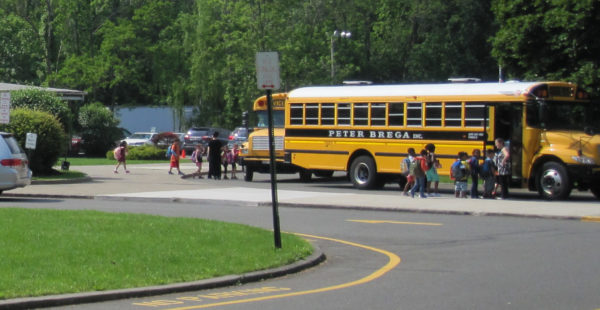
Elementary school dismissal. Photo: Susan Hellauer
by Peter Klose
On February 5, 2019, the Nyack Schools Board of Education will consider a proposal to significantly alter the school start times for Nyack’s schools. High School would start an hour later (at 8:19a); the Middle School 20 minutes earlier (at 7:45a); and the Elementary Schools 15 minutes later (at 9:05a).
The impetus for these significant changes is a nationwide campaign to get kids more sleep, with the theory being that more sleep will translate into happier kids and that those happier kids might do better in school.
No decision of this magnitude should be based upon what is “vogue,” or a “gut feeling” or “personal belief” that improved sleep might make our kids “happier.” This district must assess the evidence gathered by third parties and then make certain that any change will positively impact academic performance more than it will harm our uniquely situated families (a full 35% of whom are economically disadvantaged). Nyack Schools are different from the average suburban school, even Orangetown or Nanuet.
Let’s consider the evidence that suggests that school children should begin their school day an hour later. The literature suggests that delaying school start times until after 8:19a (or later), may be effective in proffering greater sleep durations, lower weekday-weekend differences in sleep duration, reduced daytime sleepiness, better visual reaction times, and lower rates of vehicular accidents. Those are indeed important benefits to promoting healthy students.
A careful examination of the literature shows these studies have conflicting results. There is NO systematic, comprehensive study that shows any correlation between increased sleep, later start times, and improved academic performance or attendance. Indeed, the evidence suggests that starting school later does not improve academic performance or attendance appreciably. Any recommendation to start school later is based upon expert OPINION, rather than data analysis.
High School Start Times and the Impact on High School Students: What We Know, and What We Hope to Learn is the rare example of a comprehensive study that tried to analyze many of the conflicting reports to see if there was any concrete empirical evidence to suggest improvements (Morgenthaler, et al. Journal of Clinical Sleep Medicine, Vol. 12, No. 12, 2016). In that article, the National Healthy Sleep Awareness Project Surveillance and Epidemiology workgroup was given the task of researching and critically reviewing the evidence from published studies regarding the effect of high school start times on sleep and other relevant outcomes. That review found:
- Although delaying school start times appears to be associated with an increase in total sleep duration on school nights, this does not appear to translate into improved performance as reflected in grades or standardized test scores. The literature does, however, reflect teacher and student reports of more engagement in class time activities.
- Later school start times may be associated with better behavioral health measures, but there are significant limitations in this evidence base.
- As a nation, we are in need of well-designed and appropriately powered research to illuminate these key issues so that complex trade-offs involved in community decisions to move school start times may be better informed and data driven.
While experts suggest that circadian rhythms play a role in sleep time, there is no empirical evidence to suggest that moving school start times will improve key academic or attendance improvement metrics. More to the point, the article suggests that there are “Significant limitations of the current studies” and that they “include the lack of information on adolescent subgroups such as those defined by sex, race/ethnicity, and socioeconomic status, as well as information on school characteristics such as urban/rural classification, transportation modes, and availability of extra-curricular activities.”
There should be no change in policy in school start times without data that demonstrates an “educational return.”
Stated a little differently, it is just as true that adolescent sleep times are negatively impacted by environmental factors such as homework, extracurricular activities, social activities, part-time work, and technology, which all exacerbate the tendency for teens to decrease sleep time, and are important aspects of high school life. So, why is it that we should change school start times when the evidence is, “indirect, imprecise, or derived from cohorts of convenience, making the overall quality of evidence weak or very weak.” Id.
Given the paucity of existing proof that adjusting start times will benefit our district, what are the harms to our district if it were to implement such a change? Nyack is an economically diverse population where at least 80 students work after school, whether to fund their own college prospects or to help their families with daily expenses. Changing the high school start time will not help these students get more sleep and could very well harm them by restricting their work hours.
Also, the Nyack Teacher’s Union contract specifically mandates that its members adhere to the present start times. While it is likely that the teacher’s union will not vehemently “oppose” the changes, it will likely seek some concessions. Why even negotiate these financial concessions if there is no proof of the benefit to education and to our community?
Finally, the new proposal will have many other negative effects on students. For example, the proposal being consider would start the middle school 20 minutes earlier. This makes no sense for a variety of reasons. Why don’t our middle schoolers need more sleep, just like their older classmates? If implemented, our middle school children (aged 10-13) would rise before dawn (daylight), walk to school across a busier Route 9W (with the change of the TZ Bridge approach) on streets that sometimes have no sidewalks (Upper Depew and Central Nyack). Obviously, a detrimental effect on the middle school population where at least 25% percent are not afforded transportation, and a significant portion go to school even earlier than the mandated start time to enjoy subsidized breakfast.
Indeed, the voters in this district overwhelmingly stated that they do not want this change. Through its own survey a year ago, 64% of the 1164 students and parents polled said that they do NOT want to change the school start times, whether it be because of childcare, employment, athletics, or after school activities. There are various reasons that our students and parents do not want the change, and it seems very unfair to force a change where more than 54% of all respondents, including those who stated “no opinion,” opposed it. Is the district directing parents towards what is in the best interest of their own children? Or, are we yielding to voices of a select few, to the detriment of many?
And what’s more, any delay in the elementary school schedule will adversely impact on all parents, particularly working and lower-income parents as they will now need to fund transportation and pre-school or after-school care for elementary students. Why is it a benefit to extend the school day for our youngest students (bringing them home after 4p, with little to no chance to play outside in the sunlight)?
There is a huge population of students that participate in non-school activities like club sports, dance, gymnastics, art programs, and drama clubs after school that would be impacted by the proposed start times. Moving start times later will place these students at a significant disadvantage and will drive the bedtime routines later, thereby eliminating any of the perceived benefits. Club sports will not alter schedules to accommodate the district’s later times.
The point is, at present, the district should not waste any more resources considering this issue. There are much less expensive ways to improve our students’ education and happiness.
Let’s put this sleep time debate to bed until there is real factual and economic analysis to suggest its benefits. If your family cannot afford this change, come to the next Nyack School Board Meeting at 7:30p on February 5, 2019 to be held at the administrative building, Hilltop.
References:
[1]High School Start Times and the Impact on High School Students: What We Know, and What We Hope to Learn, Morgenthaler, et al. Journal of Clinical Sleep Medicine, Vol. 12, No. 12, 2016, citing e.n. #10. Cain N, Gradisar M. Electronic media use and sleep in school-aged children and adolescents: a review. Sleep Med 2010; 11:735–42. # 11. Knutson KL, Lauderdale DS. Sociodemographic and behavioral predictors of bed time and wake time among US adolescents aged 15 to 17 years. J Pediatric 2009;154: 426–30].
[2]#Q19– How strongly do you support or oppose the following proposed change in bell schedules:– Nyack High School would start at 8:19a (49 minutes later) and end at 3:05p.- Nyack Middle School would start at 7:45a (20 minutes earlier) and end at 2:30p.- Elementary Schools would start at 9:05a (15 minutes later) and end at 3:35p.—RESPONSE- 742 Oppose to 422 Support with 198 respondents stating “No Opinion.”
See also: School Start Debate: Nyack Teenagers Need More Sleep, 2/4/2019








